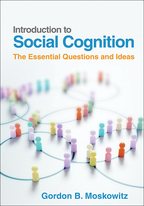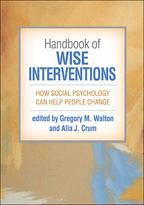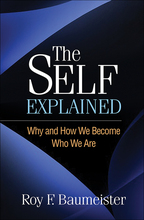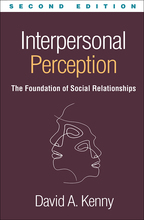Introduction to Social Cognition
The Essential Questions and Ideas
Gordon B. Moskowitz
HardcoverPaperbacke-bookprint + e-book
Hardcover
orderAugust 7, 2024
ISBN 9781462554553
Price: $125.00 557 Pages
Size: 7" x 10"
Paperback
orderMay 23, 2024
ISBN 9781462554546
Price: $83.00557 Pages
Size: 7" x 10"
e-book
orderMay 16, 2024
PDF and Accessible ePub ?
Price: $83.00 557 Pages
ePub is Global Certified Accessible
print + e-book $166.00 $99.60
orderPaperback + e-Book (PDF and Accessible ePub) ?
Price: 557 Pages
ePub is Global Certified Accessible
“Moskowitz has done a masterful job of distilling the most important topics in social cognition research into clear questions and propositions. The organization of the book is sensible and inviting to the novice, providing an approachable framework for thinking about social cognition. As with all of Moskowitz’s work, the book is thorough and of the highest level of scholarship. Filling an important need, this text will be appreciated by instructors and students alike.”

—Jeffrey W. Sherman, PhD, Department of Psychology, University of California, Davis
“Moskowitz offers a comprehensive go-to guide for students who are new to the social-cognitive perspective or seek an engaging, inclusive refresher. He describes the 'buried treasures' of social cognition—the foundational, classic studies that have shaped the field, including studies that do not typically show up in reviews—and ties in cutting-edge contemporary scholarship. Moskowitz presents a full and rich picture of where the field is now and where it is going. I will assign this text in my small advanced undergraduate- and graduate-level seminar courses as required reading for class discussions.”

—Emily Balcetis, PhD, Department of Psychology, New York University
“Providing a comprehensive review of the field, this book adeptly illustrates how researchers came to theorize about and empirically test social cognition. Chapters highlight theories and findings from several perspectives and from a diverse range of topics and researchers. The anecdotes, personal narratives, and behind-the-curtain stories woven throughout the text are a nice touch that will draw students into researchers’ laboratories and theory-building processes. This is the perfect introduction to social cognition following an introductory social psychology or cognitive psychology course.”

—Valerie Jones Taylor, PhD, Department of Psychology, Rutgers, The State University of New Jersey
—Jeffrey W. Sherman, PhD, Department of Psychology, University of California, Davis
“Moskowitz offers a comprehensive go-to guide for students who are new to the social-cognitive perspective or seek an engaging, inclusive refresher. He describes the 'buried treasures' of social cognition—the foundational, classic studies that have shaped the field, including studies that do not typically show up in reviews—and ties in cutting-edge contemporary scholarship. Moskowitz presents a full and rich picture of where the field is now and where it is going. I will assign this text in my small advanced undergraduate- and graduate-level seminar courses as required reading for class discussions.”
—Emily Balcetis, PhD, Department of Psychology, New York University
“Providing a comprehensive review of the field, this book adeptly illustrates how researchers came to theorize about and empirically test social cognition. Chapters highlight theories and findings from several perspectives and from a diverse range of topics and researchers. The anecdotes, personal narratives, and behind-the-curtain stories woven throughout the text are a nice touch that will draw students into researchers’ laboratories and theory-building processes. This is the perfect introduction to social cognition following an introductory social psychology or cognitive psychology course.”
—Valerie Jones Taylor, PhD, Department of Psychology, Rutgers, The State University of New Jersey













